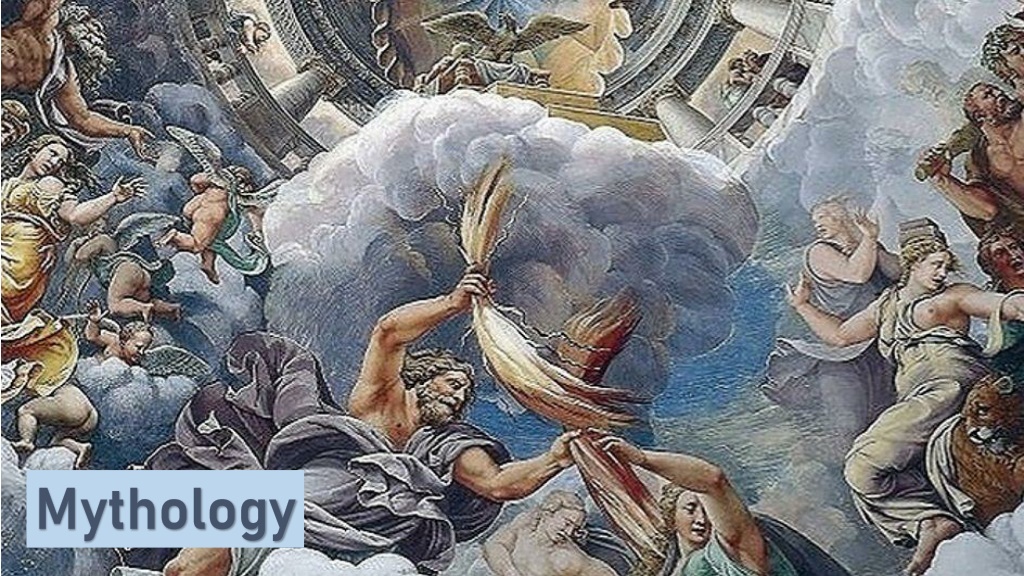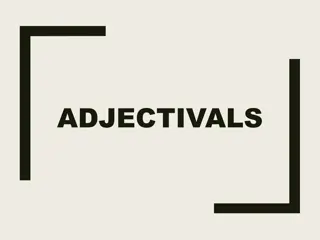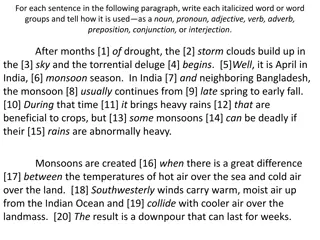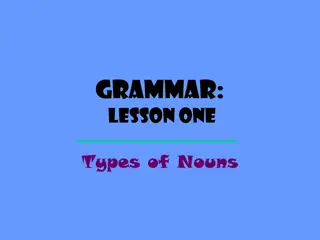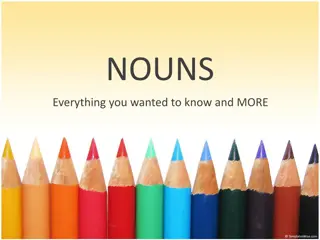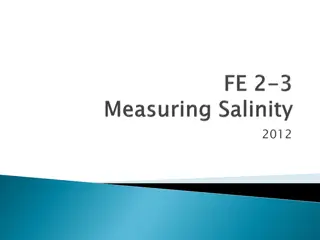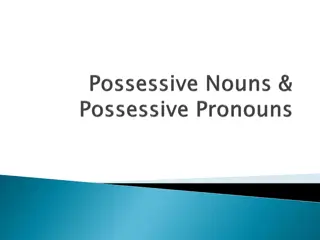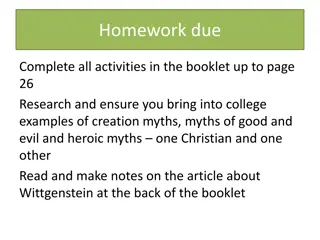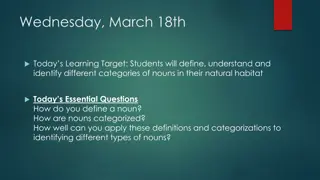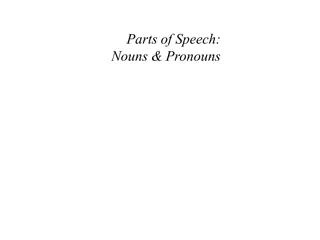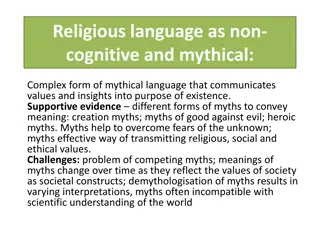Understanding Nouns and Myths
Explore the difference between proper and common nouns through examples from mythology. Learn about myths, their significance, and the different types of myths in early history. Engage in oracy activities to deepen your knowledge and understanding of this fascinating subject.
Download Presentation

Please find below an Image/Link to download the presentation.
The content on the website is provided AS IS for your information and personal use only. It may not be sold, licensed, or shared on other websites without obtaining consent from the author. Download presentation by click this link. If you encounter any issues during the download, it is possible that the publisher has removed the file from their server.
E N D
Presentation Transcript
Date: Title: Copy the following into your book: A noun is a word used to refer to a person, place or object. Do it now Do it now A proper noun is the name of a specific person, place, object or thing. All proper nouns begin with a capital letter. E.g. Paris, Sarah, The Guardian A common noun is a non-specific name (a general noun) used to refer to people, places, object or things. E.g. city, girl, newspaper A concrete noun is a noun that can be seen, heard, touched, smelt or tasted. Miss Odell is currently reading
LG: What is the difference between a proper noun and a common noun? Look at the following sentences. Can you a. identify the nouns in the sentence? b. determine whether they are examples of proper (P) or common nouns (C) 1. Zeus, king of the gods, ordered Prometheus and his brother Epimetheus to make living creatures. Do it now Do it now 2. The next time Zeus looked down from Mount Olympus, he saw something glimmering red and yellow under a column of grey smoke. 3. Although he was a god, he did not live on the top of Mount Olympus in halls of cloud and sunlight, or on the earth among trees and fields. (Sentences taken from The Oxford Book of Myths by Geraldine McCaughrean)
LG: What is the difference between a proper noun and a common noun? Look at the following sentences. Can you a. identify the nouns in the sentence? b. determine whether they are examples of proper (P) or common nouns (C) 1. Zeus, king of the gods, ordered Prometheus and his brother Epimetheus to make living creatures. Do it now Do it now 2. Zeus looked down from Mount Olympus, he saw something glimmering red and yellow under a column of grey smoke. 3. Although he was a god, he did not live on the top of Mount Olympus in halls of cloud and sunlight, or on the earth among trees and fields. (Sentences taken from The Oxford Book of Myths by Geraldine McCaughrean)
LG: What is a myth? Activate prior knowledge This term we are going to be studying mythology . Oracy opportunity opportunity What do you already know about myths? Do you know what a myth is? Have you read any myths? Do you know why myths were written? Do you know why myths are relevant today? Oracy
LG: What is a myth? New knowledge / recap prior knowledge New knowledge / recap prior knowledge What is a myth? A traditional story from early history, usually explaining how things came to be.
LG: What is a myth? What are the three types of myth? New knowledge / recap prior knowledge New knowledge / recap prior knowledge There are three types of myth Aetiological myths Historical myths Psychological myths These try to explain why we feel and act the way we do; gods control or punish behaviours, or choices, that humans make. They explain the reason why something is the way it is today. For example, a story that explains why we have seasons, or explains the natural world. These are told about a historical event; they help to keep the memory of that event alive, even if the story changes over time.
LG: Why is it important to study mythology? But why is learning about mythology important for me today in the 21st century? Oracy opportunity opportunity Oracy Talk partners
LG: Why is it important to study mythology? Reading myths helps us to understand narrative traditions We can learn a lot about the importance of narrative through the reading of myths Myths are the stories that define us New knowledge New knowledge The tropes and characters that exist in myths will become recognisable in future texts Reading myths helps to develop our cultural capital Mythology reflects the needs of society to explain things. Understanding myths helps us to understand the origin of storytelling especially orally.
LG: Why is it important to study mythology? Mythological references are everywhere so our understanding of other texts can be enhanced New knowledge New knowledge Y9 Julius Caesar Y10 Macbeth I, as Aeneas, our great ancestor, Did from the flames of Troy upon his shoulder The old Anchises bear, so from the waves of Tiber. (Act 1, Scene 2) Will all great Neptune s ocean wash this blood clean from my hand. (Act 2, Scene 2)
LG: Why is it important to study mythology? Mythological references are everywhere so our understanding of other texts can be enhanced New knowledge New knowledge Thor Percy Jackson and the Olympians Harry Potter and the Philosopher s stone In the film, the Minotaur is a monster sent by Hades to capture Sally Jackson, the mother of Percy Jackson. A character in the infamous Avengers series. The forbidden corridor guarded by a three-headed dog (called Fluffy) In Greek mythology, the Minotaur is a monster who had the body of a man and the head of a bull. Sent to Minos by Poseidon as a sacrifice, Minos decided to keep it alive and made Pasiphae fall in love with it, In Norse mythology, Thor is a Norse god who holds a magical hammer that only he can raise. He is the god of thunder. In Greek mythology, the three- headed dog is called Cerberus who guards the gates to Hades, the kingdom of the dead situated in the underworld.
LG: What is a myth? What are the three types of myth? Why is it important to study mythology? Key reflection questions: 1. What is a myth? 2. What are the three types of myth? 3. Identify three reasons why we should still continue to read myths in the 21st century? Reflection Reflection
